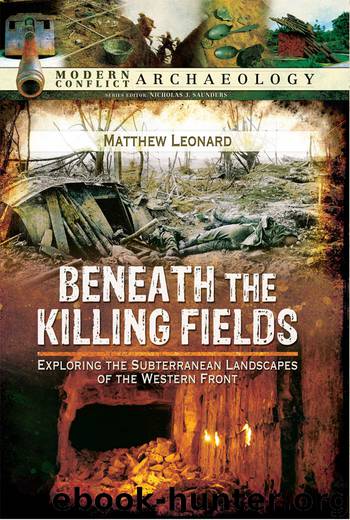Beneath the Killing Fields by Matthew Leonard

Author:Matthew Leonard
Language: eng
Format: epub
Tags: Bisac Code 1: HIS027090; HISTORY / Military / World War I
ISBN: 9781473884113
Publisher: Casemate Publishers & Book Distributors, LLC
Published: 2017-02-03T05:00:00+00:00
Leaving instructions written on the walls minimised the need to talk. Silence was paramount in front line tunnels. Throughout the system are several of these types of messages. Tunnellers could never be sure how far away the enemy was. (©Author/Durand Group)
Engaging life beneath Loos
The Durand Group’s work at Copse has exposed the physicality of a First World War multiuse tunnel system, greatly adding to the archaeological-anthropological record and furthering our understanding of the subterranean war. A decade ago the dimensions, layout and mapping of Copse would have been considered enough, but modern approaches to the archaeology of twentieth century conflict can deliver far more. A nuanced and intimate study of how the human senses engaged with and helped to create this landscape, and how this in turn affected the minds and bodies of the soldiers and tunnellers themselves can now be explored.
Tunnel systems were intrinsic to trench warfare and were thus landscapes truly in flux. Copse contains subway, fighting, listening and headquarters features and the system adapted to changing demands and functions as the war progressed. Subterranean warfare under the Loos battlefield was intense, requiring that those who fought there well understood the environments on which their lives depended.
Although no other systems in the immediate region of Copse have been fully surveyed, the Hill 70 and Hythe systems are in close proximity. The entire area was heavily mined and the proliferation of listening tunnels and possible mine chambers at Copse, particularly in the Deep Deep section, as well as war diary entries, suggest that German tunnels were close by. This made Copse a sensorially demanding environment perhaps more suited to the tunnellers than the infantry.
Tunnellers were mainly (but not exclusively) recruited from civilian ‘clay-kickers’28 used to digging narrow tunnels for pipe work and cables, and mineral miners or diggers accustomed to working in confined conditions, usually in coalmines, sewers or on the construction of subterranean railways. Nevertheless, the working conditions beneath the Western Front threatened far more dangers than either group were used to – controlling or reconfiguring the senses was vital to deal with these risks, especially in the more complex subterranean landscapes. The High Command had its doubts as to whether even the clay-kickers could adapt to the conditions. Even for the most experienced miners the assault on the senses began almost as soon as they were recruited.
Download
This site does not store any files on its server. We only index and link to content provided by other sites. Please contact the content providers to delete copyright contents if any and email us, we'll remove relevant links or contents immediately.
| Africa | Americas |
| Arctic & Antarctica | Asia |
| Australia & Oceania | Europe |
| Middle East | Russia |
| United States | World |
| Ancient Civilizations | Military |
| Historical Study & Educational Resources |
The Radium Girls by Kate Moore(11994)
100 Deadly Skills by Clint Emerson(4898)
Rise and Kill First by Ronen Bergman(4752)
The Templars by Dan Jones(4669)
The Doomsday Machine by Daniel Ellsberg(4467)
The Rape of Nanking by Iris Chang(4187)
Killing England by Bill O'Reilly(3985)
Stalin by Stephen Kotkin(3934)
Hitler in Los Angeles by Steven J. Ross(3932)
12 Strong by Doug Stanton(3536)
Hitler's Monsters by Eric Kurlander(3312)
Blood and Sand by Alex Von Tunzelmann(3178)
The Code Book by Simon Singh(3154)
Darkest Hour by Anthony McCarten(3110)
The Art of War Visualized by Jessica Hagy(2983)
Hitler's Flying Saucers: A Guide to German Flying Discs of the Second World War by Stevens Henry(2736)
Babylon's Ark by Lawrence Anthony(2658)
The Second World Wars by Victor Davis Hanson(2508)
Tobruk by Peter Fitzsimons(2492)
